in this article you will discover how the epistemology of idealism shapes education, fostering critical thinking and moral development. Explore its relevance in modern pedagogy. Idealism stands as a foundational pillar in educational philosophy shaping how educators perceive knowledge, learning, and the very purpose of education itself. Rooted in the works of prominent philosophers like Plato and Immanuel Kant, idealism posits that reality is fundamentally shaped by the mind, emphasizing the importance of ideas, values, and concepts in understanding the world. The epistemological framework of idealism exerts a profound influence, guiding pedagogical approaches, curriculum design, and educational goals. This article aims to delve into the epistemology of idealism in education, examining its principles, implications, and relevance in contemporary educational discourse.
In educational philosophy, the epistemology of idealism stands as a beacon, illuminating the path toward a deeper understanding of knowledge acquisition, learning processes, and the very essence of education itself. Rooted in the belief that reality is fundamentally shaped by the mind, the epistemology of idealism offers a compelling framework for educators, researchers, and students alike to explore the intricacies of intellectual growth, critical inquiry, and moral development within the educational.
At the heart of idealism lies a profound insight into the nature of knowledge and its acquisition. Plato, one of the foundational figures of idealist philosophy, articulated the notion that reality consists not only of the tangible world of sensory experiences but also of abstract, immutable Forms. These Forms, according to Plato, represent the true essence of reality, accessible only through the mind’s capacity for rational reflection and contemplation. Kant further expanded upon this idealist perspective, proposing a transcendental framework wherein knowledge is structured by the mind’s innate cognitive faculties, shaping our perception of the world and the truths we hold to be self-evident.
The implications of idealism for pedagogy are far-reaching and transformative. Idealist educators view the classroom not merely as a space for information dissemination but as a crucible for intellectual growth, critical thinking, and moral development. By embracing the principles of idealism, educators seek to cultivate in students a love of learning, a commitment to intellectual integrity, and a sense of moral responsibility. Socratic dialogue, a method of inquiry championed by idealist thinkers, plays a central role in idealist pedagogy, fostering deep reflection, conceptual analysis, and the pursuit of truth.
Furthermore, the epistemology of idealism informs curriculum design, emphasizing the importance of a balanced and comprehensive approach to education. Idealist educators advocate for an integrated curriculum that encompasses a broad range of subjects, including the humanities, sciences, arts, and social sciences. By providing students with a rich and diverse educational experience, idealism prepares them to engage meaningfully with the complexities of the modern world, equipped with the tools and insights necessary to navigate intellectual, ethical, and moral challenges with wisdom and integrity.
In this article, we will explore deeper into the epistemology of idealism in education, exploring its historical roots, key concepts, and implications for contemporary pedagogy. Through an interdisciplinary lens, we will examine how idealist principles shape teaching practices, curriculum development, and the role of educators in fostering student growth and development. Join us on this journey as we unravel the mysteries of the mind and explore the transformative power of idealism in education.
Summary of the article
- Idealism emphasizes that reality is shaped by the mind, challenging the conventional view of knowledge acquisition.
- Plato and Kant are key figures in idealist philosophy, with Plato’s theory of Forms and Kant’s transcendental idealism providing foundational insights.
- Idealism highlights the active role of the mind in constructing knowledge, leading to a focus on intellectual development and critical thinking skills.
- In contemporary education, idealist principles inform teaching practices, curriculum design, and the role of educators.
- Teaching methods like Socratic dialogue encourage inquiry-based learning and interdisciplinary exploration.
- The idealist curriculum emphasizes holistic learning, including the humanities, sciences, arts, and social sciences.
- Idealist educators act as facilitators of learning, nurturing students’ intellectual growth and fostering a supportive learning environment.
- Ethical and moral education are integral to idealism, preparing students to become responsible citizens.
The summarized table highlighting the key points from the sections on the epistemology of idealism and its implications for contemporary education:
| Aspect | Epistemology of Idealism | Implications for Contemporary Education |
| Core Tenets | Reality is shaped by the mind; knowledge is actively constructed | Fostering critical thinking, inquiry-based learning, and interdisciplinary exploration |
| Foundational Thinkers | Plato, Kant | Plato, Kant, contemporary idealist educators |
| Knowledge Acquisition | Mind actively shapes reality; and transcends traditional dichotomies | Inquiry-based learning, critical reflection, interdisciplinary exploration |
| Role of Educator | Facilitator of learning; fosters intellectual growth and inquiry | Guide and mentor; promotes dialogue, critical thinking, and ethical awareness |
| Curriculum Design | Integrated and comprehensive; interdisciplinary approach | Balanced curriculum; humanities, sciences, arts, and social sciences |
| Ethical/Moral Education | Integral part of education; cultivates ethical awareness | Fosters ethical responsibility, compassion, and integrity |
| Relevance in Modern Context | Timeless framework; adaptable to changing educational landscapes | Provides insights for navigating complex challenges with wisdom and integrity |
1. Understanding Idealism in Education
Idealism asserts that reality is grounded in ideas rather than material phenomena. According to idealist thinkers, such as Plato, knowledge is not derived from sensory experiences alone but emerges through rational reflection and introspection. In the context of education, idealism places a strong emphasis on the cultivation of intellectual virtues, critical thinking skills, and the pursuit of truth and wisdom. Teachers, in the idealist paradigm, serve as facilitators of knowledge, guiding students on a journey of self-discovery and intellectual growth.
Idealism stands as one of the oldest and most influential philosophical traditions, permeating various domains of human thought, including education. At its essence, idealism posits that reality is fundamentally mental or spiritual in nature, emphasizing the primacy of ideas, concepts, and values. In education, idealism offers a rich framework for understanding the nature of knowledge, the role of the educator, and the purpose of schooling. This section delves into the core tenets of idealism in education, exploring its historical roots, key concepts, and implications for pedagogy.
Historical Roots of Idealism
The origins of idealism in Western philosophy can be traced back to ancient Greece, with figures like Plato laying the groundwork for subsequent idealist thinkers. Plato’s allegory of the cave, articulated in his seminal work “The Republic,” exemplifies the idealist perspective on knowledge and reality. In the allegory he describes a group of prisoners confined to a cave, perceiving only the shadows of objects projected on the wall. For Plato, the cave symbolizes the world of appearances, while true knowledge lies in the Forms, abstract entities that exist independently of sensory experience. This dualistic view of reality, with its emphasis on the transcendent realm of ideas, profoundly influenced the development of idealist philosophy.
In the modern era, idealism found expression in the works of philosophers like George Berkeley and Immanuel Kant. Berkeley, an Irish philosopher, espoused a form of idealism known as subjective idealism, arguing that reality consists of ideas perceived by the mind and that material objects exist only as collections of ideas. Kant, on the other hand, proposed a nuanced synthesis of idealism and empiricism, asserting that knowledge is constructed through the interaction of sensory experience and innate mental structures. Kant’s transcendental idealism posited that the mind imposes its own conceptual framework on the raw data of experience, shaping our understanding of the world.
Key Concepts in Idealism
Central to the idealist perspective on education is the concept of the mind as the primary locus of reality. Idealist philosophers contend that the human intellect possesses the capacity to apprehend universal truths and abstract concepts, transcending the limitations of empirical observation. Knowledge, in the idealist view, is not passively received from the external world but actively constructed by the mind through rational reflection and introspection.
Idealism emphasizes the interconnectedness of ideas and the importance of holistic learning. Rather than viewing knowledge as a collection of discrete facts or isolated disciplines, idealist educators advocate for an integrated approach that fosters interdisciplinary connections and promotes intellectual synthesis. This holistic conception of knowledge aligns with the liberal arts tradition, which emphasizes the cultivation of well-rounded individuals capable of engaging with diverse perspectives and disciplines.
Implications for Pedagogy
The epistemological foundations of idealism have profound implications for pedagogical practice. Educators who embrace an idealist philosophy prioritize the development of students’ intellectual faculties, encouraging them to engage critically with ideas, theories, and philosophical inquiries. Socratic dialogue, a method of inquiry championed by idealist thinkers, plays a central role in idealist pedagogy, fostering deep reflection, conceptual analysis, and the pursuit of truth.
Idealist educators also emphasize the importance of cultivating ethical awareness and moral reasoning in students. In the idealist view, education is not merely a means to acquire knowledge but a transformative process that shapes individuals’ character and values. Thus, idealist pedagogy incorporates moral and civic education, encouraging students to reflect on ethical dilemmas, consider the consequences of their actions, and develop a sense of social responsibility.
Idealist philosophy informs curriculum design, advocating for a balanced and comprehensive approach to education. Idealist educators believe that the curriculum should encompass a broad range of subjects, including the humanities, sciences, arts, and social sciences, providing students with a well-rounded education that nurtures their intellectual, emotional, and spiritual growth.
The Understanding of idealism in education requires a nuanced exploration of its historical roots, key concepts, and implications for pedagogy. Rooted in the belief that reality is fundamentally mental or spiritual in nature, idealism offers a compelling framework for understanding the nature of knowledge, the role of the educator, and the purpose of schooling. Through the principles of idealism, educators can inspire students to embark on a journey of self-discovery, critical reflection, and lifelong learning, thereby fulfilling the transformative potential of education.
2. Epistemological Foundations of Idealism
Epistemology, the branch of philosophy concerned with the nature and scope of knowledge, plays a central role in idealist thought. Within the framework of idealism, knowledge is viewed as inherently subjective, shaped by the mind’s interpretation of reality. Idealist philosophers argue that the human intellect possesses the capacity to apprehend universal truths and abstract concepts, transcending the limitations of empirical observation. Thus, in the realm of education, the epistemology of idealism underscores the importance of cultivating intellectual curiosity, fostering dialogue, and engaging in dialectical inquiry.
Epistemological Foundations of Idealism
Epistemology, the branch of philosophy concerned with the nature and scope of knowledge, lies at the heart of idealist thought. Within the framework of idealism, knowledge is not perceived as a passive reflection of an objective reality but as a product of the mind’s active engagement with the world. This section delves into the epistemological foundations of idealism, examining how idealist philosophers conceptualize the nature of knowledge, the role of the mind, and the relationship between subjectivity and objectivity.
Subjectivity and Objectivity in Idealism
Idealism challenges the traditional dichotomy between subjectivity and objectivity, contending that reality is fundamentally shaped by the mind. Unlike empiricism, which emphasizes the passive reception of sensory data, idealism asserts that the mind actively constructs reality through conceptual interpretation and rational reflection. For idealist philosophers like Plato and Kant, knowledge is not a direct reflection of an external reality but a mediated representation that emerges through the interaction of sensory experience and mental faculties.
Plato’s theory of Forms exemplifies this idealist perspective on knowledge. According to Plato, the world of sensory appearances is characterized by impermanence and flux, whereas the Forms represents the eternal, unchanging truths. Knowledge, in Plato’s view, consists of the soul’s recollection of the Forms, facilitated through dialectical inquiry and intellectual intuition. Thus, for Plato, true knowledge transcends the realm of empirical observation, relying instead on the mind’s capacity to grasp universal concepts and ideals.
Kant’s transcendental idealism offers a more nuanced account of the relationship between subjectivity and objectivity. Drawing on insights from both rationalism and empiricism, Kant argues that knowledge is structured by the mind’s innate cognitive faculties, known as the categories of understanding. These categories, such as space, time, and causality, serve as the framework through which we interpret and make sense of sensory experience. However, Kant also recognizes the importance of empirical observation in grounding our knowledge claims, maintaining that sensory data provide the raw material upon which the mind imposes its conceptual framework.
Thus, for Kant, knowledge is neither purely subjective nor purely objective but emerges through the synthesis of subjective mental activity and objective sensory input. This synthesis, known as the transcendental unity of apperception, enables us to construct a coherent and meaningful understanding of the world.
The Role of the Mind in Knowledge Acquisition
Central to the epistemology of idealism is the belief in the active role of the mind in knowledge acquisition. Idealist philosophers contend that the mind is not a passive receptacle of sensory impressions but an active agent that actively constructs reality through conceptual interpretation and rational reflection. This view contrasts sharply with empiricism, which posits that knowledge is derived solely from sensory experience.
Plato’s theory of anamnesis illustrates the idealist perspective on the mind’s role in knowledge acquisition. According to Plato, the soul possesses innate knowledge of the Forms, which it recollects through dialectical inquiry and intellectual intuition. For Plato, learning is not a process of acquiring new information but of rediscovering what the soul already knows. Thus, education, in the Platonic tradition, is not simply the imparting of knowledge but the awakening of the soul to its own inherent wisdom.
Kant’s transcendental idealism offers a more nuanced account of the mind’s role in knowledge acquisition. Kant argues that the mind actively structures and organizes sensory experience according to its own cognitive categories, such as space, time, and causality. These categories serve as the a priori conditions of possibility for experience, shaping our perception of the world. However, Kant also recognizes the importance of empirical observation in grounding our knowledge claims, maintaining that sensory data provide the raw material upon which the mind imposes its conceptual framework.
Thus, for Kant, knowledge emerges through the interaction of the mind’s innate cognitive faculties and sensory experience. The mind’s activity is not limited to passive perception but involves active synthesis and interpretation, enabling us to construct a coherent and meaningful understanding of the world.
Idealism and the Nature of Truth
Idealist philosophers offer distinctive perspectives on the nature of truth and the criteria for assessing the validity of knowledge claims. Unlike empiricism, which tends to equate truth with correspondence to an external reality, idealism emphasizes the role of the mind in constructing truth through rational reflection and conceptual interpretation.
For Plato, truth is synonymous with the apprehension of the Forms, eternal and immutable realities that transcend the realm of sensory experience. Knowledge, in the Platonic tradition, consists of the soul’s recollection of the Forms, facilitated through dialectical inquiry and intellectual intuition. Thus, truth is not discovered through empirical observation but attained through rational reflection and contemplation of the eternal and unchanging.
Kant’s transcendental idealism offers a more nuanced account of truth, drawing a distinction between empirical truth and transcendental truth. Empirical truth, according to Kant, consists of knowledge claims that are grounded in sensory experience and subject to empirical verification. Transcendental truth, on the other hand, pertains to the fundamental structures and principles that govern our experience of the world, such as the categories of understanding and the principles of causality and necessity.
In the Kantian framework, transcendental truth is not accessible through empirical observation but is presupposed by our cognitive faculties as the a priori conditions of possibility for experience. Thus, while empirical truth is contingent and subject to revision based on new evidence, transcendental truth is necessary and invariant, providing the foundation for our empirical knowledge claims.
To summarize, the epistemological foundations of idealism offer a rich and nuanced framework for understanding the nature and scope of knowledge. Rooted in the belief that reality is fundamentally shaped by the mind, idealism challenges conventional distinctions between subjectivity and objectivity, emphasizing the active role of the mind in constructing reality. By exploring the role of the mind in knowledge acquisition, the nature of truth, and the criteria for assessing knowledge claims, idealist philosophers offer valuable insights into the nature of knowledge and the conditions of its possibility.
3. Relevance in Contemporary Education
Despite the rise of alternative educational philosophies, idealism continues to exert a profound influence on contemporary education. In an age characterized by rapid technological advancement and information proliferation, the principles of idealism offer a timeless framework for navigating the complexities of the modern world. By emphasizing the importance of critical thinking, ethical reasoning, and intellectual exploration, idealism provides educators with a guiding philosophy that is adaptable to diverse educational contexts and responsive to the evolving needs of students.
Idealism, as a philosophical perspective, offers a unique epistemological framework that challenges conventional views on the nature and scope of knowledge. Rooted in the belief that reality is fundamentally shaped by the mind, idealism posits that knowledge is not passively received from the external world but actively constructed through rational reflection and conceptual interpretation. This section explores the epistemology of idealism and its relevance in contemporary education, examining how idealist principles inform teaching practices, curriculum design, and educational goals in the context of a rapidly evolving global landscape.
Epistemological Foundations of Idealism
At the core of idealist epistemology lies the belief in the active role of the mind in shaping reality. Idealist philosophers contend that knowledge is not a direct reflection of an external reality but a mediated representation that emerges through the interaction of sensory experience and mental faculties. This view challenges the traditional dichotomy between subjectivity and objectivity, emphasizing the interconnectedness of ideas and the importance of holistic learning.
Plato, one of the founding figures of idealism, articulated this perspective in his theory of Forms. According to Plato, reality consists of two realms: the world of sensory appearances, characterized by impermanence and flux, and the realm of Forms, comprising eternal and immutable truths. Knowledge, in the Platonic tradition, consists of the soul’s recollection of the Forms, facilitated through dialectical inquiry and intellectual intuition. Thus, for Plato, true knowledge transcends the realm of empirical observation, relying instead on the mind’s capacity to grasp universal concepts and ideals.
Kant’s transcendental idealism offers a more nuanced account of the relationship between the mind and reality. Kant argues that knowledge is structured by the mind’s innate cognitive faculties, known as the categories of understanding. These categories serve as the framework through which we interpret and make sense of sensory experience. However, Kant also recognizes the importance of empirical observation in grounding our knowledge claims, maintaining that sensory data provide the raw material upon which the mind imposes its conceptual framework.
Implications for Contemporary Education
The epistemology of idealism has profound implications for contemporary education, shaping how educators perceive the nature of knowledge, learning, and intellectual inquiry. By emphasizing the active role of the mind in knowledge acquisition and the interconnectedness of ideas, idealism offers a compelling framework for fostering intellectual growth, critical thinking skills, and a deep understanding of the world.
In the contemporary educational landscape, idealist principles inform teaching practices that prioritize inquiry-based learning, critical reflection, and interdisciplinary exploration. Educators who embrace an idealist perspective seek to create learning environments that stimulate students’ intellectual curiosity, encourage them to ask probing questions, and engage in meaningful dialogue with peers and teachers.
Moreover, idealism underscores the importance of a balanced and comprehensive curriculum that goes beyond the mere transmission of facts and figures to encompass a broad range of subjects, including the humanities, sciences, arts, and social sciences. This interdisciplinary approach to education reflects the idealist belief in the interconnectedness of knowledge and the importance of fostering intellectual synthesis.
Idealism also emphasizes the role of the educator as a facilitator of learning. Rather than simply transmitting knowledge to students, idealist educators view themselves as guides and mentors, nurturing students’ intellectual growth and fostering a supportive learning environment. Socratic dialogue, a method of inquiry championed by idealist thinkers, plays a central role in idealist pedagogy, encouraging students to engage critically with ideas, ask probing questions, and construct their own understanding of the world.
Furthermore, idealism highlights the importance of ethical and moral education in preparing students to navigate the complexities of the modern world with wisdom, compassion, and integrity. By exposing students to diverse perspectives and fostering a deep appreciation for the richness and complexity of human experience, idealist educators empower students to become thoughtful and responsible citizens who contribute positively to society.
The epistemology of idealism offers a compelling framework for understanding the nature of knowledge and its relevance in contemporary education. By emphasizing the active role of the mind in knowledge acquisition, the interconnectedness of ideas, and the importance of holistic learning, idealism provides educators with valuable insights into how to cultivate intellectual growth, critical thinking skills, and ethical awareness in students. In an age characterized by rapid technological advancement and global interconnectedness, the principles of idealism offer a timeless and adaptable framework for navigating the complexities of the modern world with wisdom, compassion, and integrity.
4. Implications for Pedagogy of Idealism in Education
The epistemological principles of idealism have significant implications for pedagogical practice. Educators who adhere to an idealist philosophy prioritize the development of students’ intellectual faculties, encouraging them to engage critically with ideas, theories, and philosophical inquiries. Socratic dialogue, a method of inquiry championed by idealist thinkers, plays a central role in idealist pedagogy, fostering deep reflection, conceptual analysis, and the pursuit of truth. Furthermore, idealist educators advocate for a curriculum that emphasizes the liberal arts, ethics, and aesthetics, aiming to cultivate well-rounded individuals capable of contributing to society.
Idealism, as a philosophical tradition, has profound implications for pedagogical theory and practice. Grounded in the belief that reality is fundamentally shaped by the mind, idealist educators prioritize the cultivation of intellectual virtues, critical thinking skills, and the pursuit of truth and wisdom. This section explores the implications of idealism for pedagogy, examining how idealist principles inform teaching methods, curriculum design, and the role of the educator in fostering student growth and development.
Emphasis on Intellectual Development
Central to the pedagogy of idealism is the emphasis on intellectual development and the cultivation of critical thinking skills. Idealist educators believe that education should not only transmit knowledge but also stimulate students’ intellectual curiosity and foster a love of learning. Socratic dialogue, a method of inquiry championed by idealist thinkers, plays a central role in idealist pedagogy, encouraging students to engage critically with ideas, ask probing questions, and engage in dialectical inquiry.
In the idealist view, education is not simply a means to an end but a transformative process that shapes individuals’ character and values. Idealist educators aim to cultivate in students a commitment to intellectual integrity, moral responsibility, and the pursuit of truth. By fostering a culture of intellectual inquiry and open dialogue, idealist pedagogy seeks to empower students to think critically, reason analytically, and make informed judgments about the world around them.
Integrated Curriculum Design
Another key implication of idealism for pedagogy is the importance of an integrated and holistic curriculum. Idealist educators advocate for a curriculum that goes beyond the mere transmission of facts and figures to encompass a broad range of subjects, including the humanities, sciences, arts, and social sciences. This interdisciplinary approach to education reflects the idealist belief in the interconnectedness of knowledge and the importance of fostering intellectual synthesis.
Furthermore, idealist educators recognize the role of education in shaping individuals’ character and values. In addition to academic subjects, the idealist curriculum often includes instruction in ethics, aesthetics, and moral philosophy, aiming to cultivate students’ ethical awareness and moral reasoning. By exposing students to diverse perspectives and fostering a deep appreciation for the richness and complexity of human experience, the idealist curriculum prepares students to engage meaningfully with the world around them and contribute positively to society.
Role of the Educator as Facilitator
According to the idealistic pedagogy, the role of the educator is not simply to transmit knowledge but to serve as a facilitator of learning. Idealist educators view themselves as guides and mentors, nurturing students’ intellectual growth and fostering a supportive learning environment. Rather than imposing their own views or opinions on students, idealist educators encourage students to explore ideas independently, engage in critical dialogue, and construct their own understanding of the world.
Socratic dialogue, a hallmark of idealist pedagogy, exemplifies the educator’s role as facilitator. By asking probing questions, encouraging reasoned debate, and challenging students to defend their beliefs, the educator stimulates intellectual curiosity and promotes active engagement with course material. Idealist educators believe that learning is not a passive process but an active, dynamic interaction between students and teachers, characterized by mutual respect, empathy, and collaboration.
Furthermore, idealist educators recognize the importance of fostering a supportive learning environment that values diversity, equity, and inclusion. By creating a classroom culture that celebrates different perspectives and encourages respectful dialogue, idealist educators empower students to express themselves authentically and engage with course material in meaningful and transformative ways.
The pedagogy of idealism offers a compelling vision for education that prioritizes intellectual development, integrated curriculum design, and the role of the educator as facilitator. Grounded in the belief that reality is fundamentally shaped by the mind, idealist educators seek to cultivate in students a love of learning, a commitment to intellectual integrity, and a sense of moral responsibility. By fostering a culture of intellectual inquiry, open dialogue, and mutual respect, idealist pedagogy prepares students to navigate the complexities of the modern world with wisdom, compassion, and integrity.
The epistemology of idealism remains a foundational concept in the field of education, shaping how educators perceive the nature of knowledge, learning, and intellectual inquiry. Grounded in the belief that reality is fundamentally shaped by the mind, idealism offers a compelling framework for fostering intellectual growth, cultivating wisdom, and nurturing the next generation of thinkers and leaders. By embracing the principles of idealism, educators can inspire students to embark on a journey of self-discovery, critical reflection, and lifelong learning, thereby fulfilling the transformative potential of education.
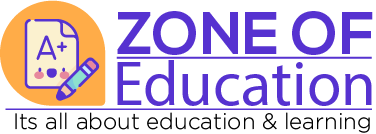
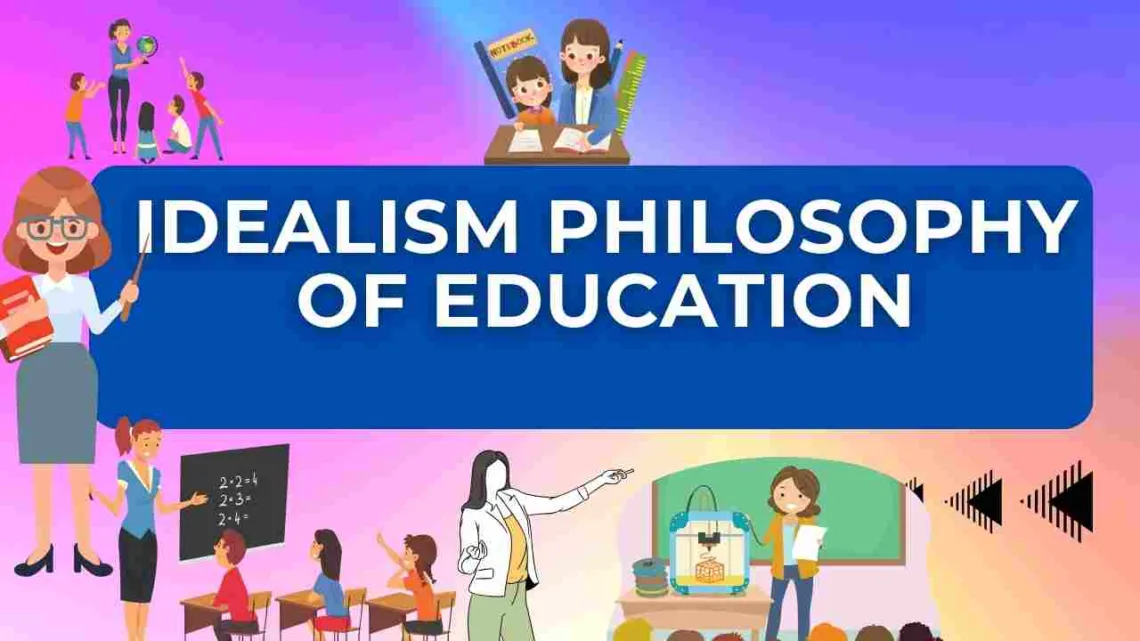


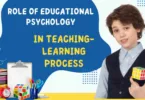
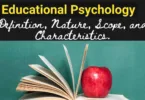
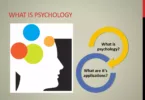

[…] and learning. Every teacher brings their own set of beliefs and assumptions to the classroom, shaped by their education, experiences, and cultural background. Understanding these beliefs allows teachers to align their […]
[…] the content and structure of the curriculum; shapes educational objectives, methods, and […]
[…] design is instrumental in investigating various interventions’ impact on human behavior. Whether exploring the effects of educational programs, behavioral interventions, or policy changes, this methodology allows researchers to […]
[…] sensory integration. Sensory play can also serve as a form of self-expression, allowing children to explore and express their emotions in a safe and nurturing […]
[…] Exploration of Universal Values. Idealism places more emphasis on more universal objects of […]
[…] to delve into the profound impact of relationships on the early development of children. We will explore the critical role that relationships play in shaping a child’s emotional and social well-being and how these early experiences influence their future […]
[…] and aims of education, are interrelated and mutually reinforcing. The philosophy of education shapes the aims of education, which serve as a guide for educational practices. The aims of education […]
[…] own unique perspective on teaching and learning. Understanding these philosophies is critical to shaping educational practices. Here are some of the major philosophies of […]
[…] a democratic society is the best means of achieving humanitarian ideals. They want to utilize education to create democratic values and ideals in learners so that they can be trained to occupy a responsible place in a democratic […]
[…] and realism differ in the following respects on the various questions of […]
[…] Herbert Mead (1863-1931): Developed the concept of social self and explored the role of communication and interaction in shaping individual […]
[…] has numerous advantages, it is not devoid of detractors. Others contend that Pragmatism in education gives precedence to practical achievements over other ideals, such as ethics and morality. They contend that educators must consider the ethical implications of […]